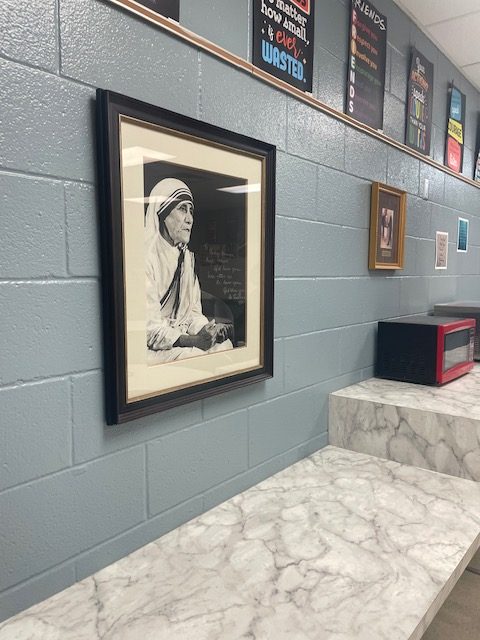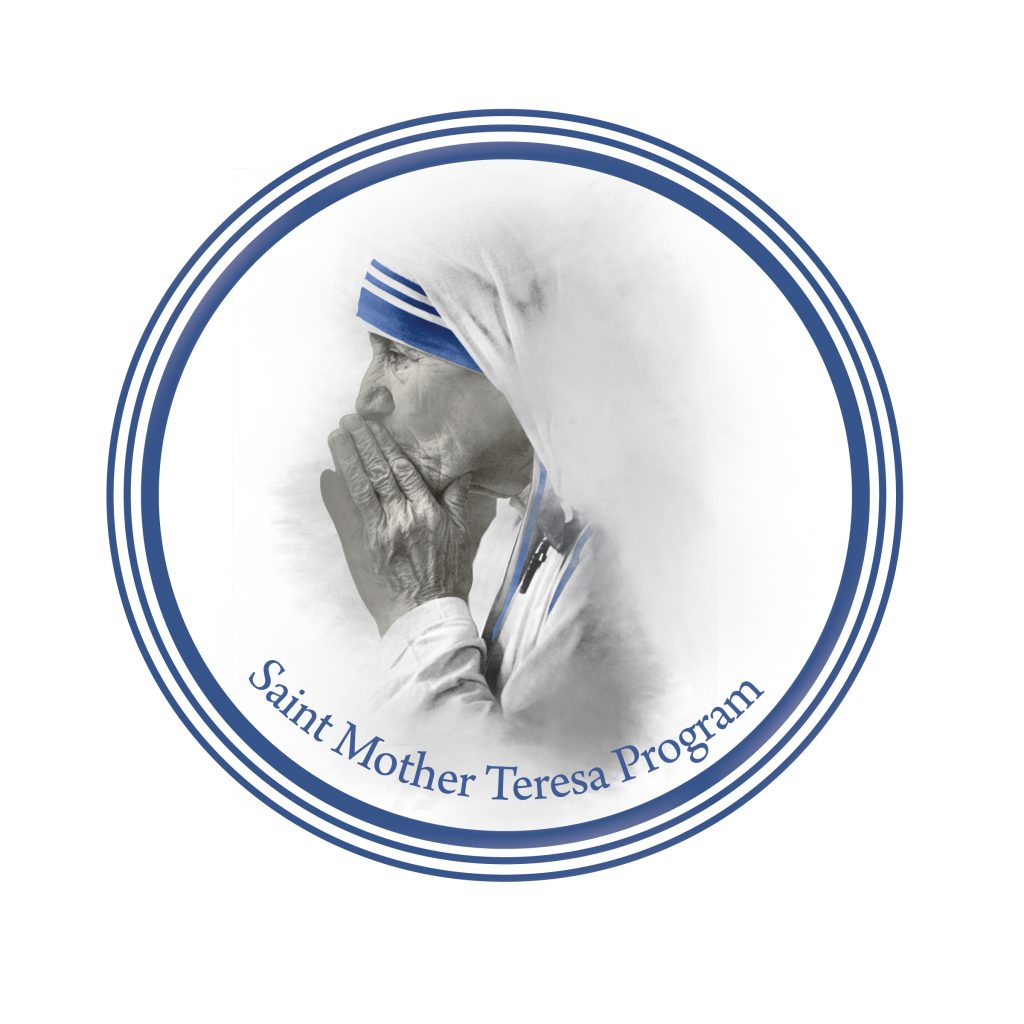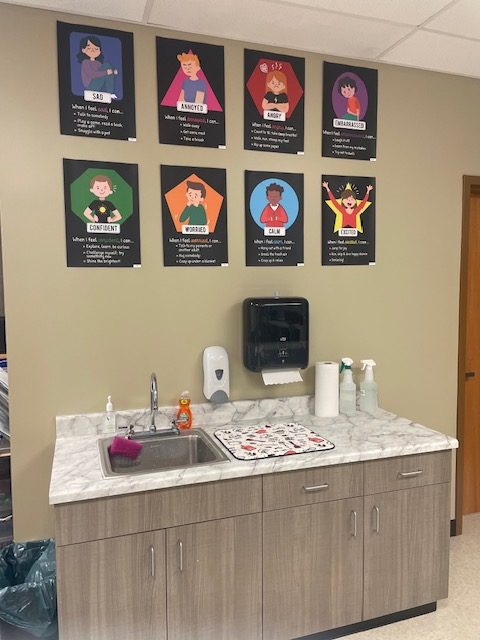May 25, 2021 // Diocese
St. Mother Teresa Program walks with moderate-abilities students
Bishop Dwenger High School in Fort Wayne is making strides to accommodate students with special needs, debuting the St. Mother Teresa Program this year. A new initiative, the program is specially designed for students with moderate abilities.
Bishop Dwenger has accepted students with various learning and cognitive disabilities for several years, providing a resource room and in-class modifications for those who need additional aid. Lauren Slater heads the special education program, Gloria Gonzalez manages the resource room, and new hire Erin Rethlake brought her skills to the special education team by creating the curriculum for the St. Mother Teresa scholars and taking the lead role as a teacher.

Photos provided by Erin Rethlake
This school year, Bishop Dwenger High School, Fort Wayne, added a program and classroom space for students with moderate disabilities so they could receive a Catholic education focused on learning life skills. The program is named for St. Mother Teresa, who had a great love of children and gave priority to educating them.
Her goals for the program are focused more on everyday life skills, rather than preparing for college, “whether that’s independent living skills, working, handling money, any sort of job skills they would potentially need. We do budgeting,” Rethlake said. “Instead of focusing on more curriculum-based subjects, of knowing how to do algebra, geometry, it’s ‘How do I apply their skills to what they’ll do after high school?’ So that’s what it’s more based toward. … There are academics, obviously, but there’s more independent skills; living, working.”
The pandemic has inhibited those plans, preventing staff from taking students off campus to engage in life skills activities such as shopping for necessities and working outside the home. Instead of utilizing resources such as Gigi’s Playhouse – an education center for those with Down syndrome, conveniently located across the street from the school – Rethlake has put this year’s focus on acclimating the students to the Bishop Dwenger environment. She stated, “It really has been the best-case scenario for the circumstances. It was nice; it was almost like a transition year.”
For its pilot year, the program welcomed two students who spend four of their seven daily class periods in the moderate-abilities classroom and the other three with their peers in general education classes. Rethlake explained that the students in the program attend traditional classes such as theology to hear lectures and participate to the best of their ability but will work on a separate curriculum from their peers.
“It’s a different platform, for students to be in this room. It’s more like people who need more assistance in the classroom, who aren’t quite at grade level, whether that would be a cognitive disability or a health issue that would inhibit them from being successful in the general education classroom,” Rethlake said.
 The St. Mother Teresa Program has been several years in the making. With the growing demand for special education in a Catholic environment, there was talk between the school’s administration and the special education department about creating a specialized program to meet this need.
The St. Mother Teresa Program has been several years in the making. With the growing demand for special education in a Catholic environment, there was talk between the school’s administration and the special education department about creating a specialized program to meet this need.
Principal Jason Schiffli recalled that when Bishop Kevin C. Rhoades arrived in the diocese roughly 10 years ago, one of his goals was for the schools to provide greater special education programs. However, Slater stated that, “We all knew that if we weren’t able to do it right, we weren’t going to do it.”
Bringing the dream to fruition took time. The biggest obstacle to overcome was lack of space.
Bishop Dwenger has undergone many expansions and renovations in its nearly 60-year history. Classroom space has always been at a premium. The team eventually came up with a solution: taking a portion of library space and renovating it into a testing center freed up a room into which the health class could move. The former health classroom, which is situated directly next to the resource room, was a perfect candidate for conversion into a moderate-abilities classroom, complete with installing a connecting door to the resource room.

There is still plenty of room for growth in the program. Slater hopes to add more educational tools each year. By next year, the plan is for a sensory swing to be installed in the classroom for those who need its calming effects, as well as possibly the purchase of appliances to teach students basic cooking skills.
Most of the students who will go through the St. Mother Teresa Program are not expected to attain a traditional high school diploma, but rather a certificate of completion, though the option for diploma is not completely off the table. “But we want them to be in this Catholic environment, we want them to be with their peers and their siblings and to receive that big piece of being around their faith. That’s why they’re here,” Slater said.
Peer interaction is key to the students’ overall education, and St. Mother Teresa students eat with their peers and will be encouraged to get involved in extracurricular activities. Slater noted that other Bishop Dwenger students have been very accepting and welcoming and would like to develop a peer mentor program between themselves and the St. Mother Teresa students.
Next year’s students have already been selected, and Rethlake describes the two future Saints as “so excited.” For the time being, students are being chosen from feeder schools. The department established a thorough screening process to ensure that they mesh well in the classroom and that their abilities can be developed through an individualized curriculum.
As each person is a unique individual, so the curriculum is tailored to each student’s abilities. Slater explained, “We get the flexibility of making it work for that student. It’s been super fun.”
Though she is new to the Bishop Dwenger community, Rethlake has a special connection with students with disabilities, having grown up with a sister who “would be in a classroom like this.”
The program is starting small, but she looks forward to bringing in more students at various levels of need and behavior. “I think that as the program grows and we have more awareness that this is an option for people, I think our levels will start to change.”
The team has seen a great deal of support for the program. Classroom aide Dawn Case testified to the community’s interest, sharing how people have asked her to describe it to them. She sums up its mission by saying that it “embodies our Catholic faith… It’s the right thing to do.”
The best news. Delivered to your inbox.
Subscribe to our mailing list today.






